Relationships, sex, communists and, somewhere off camera ,World War II — The Male Animal from 1942 is a curious film to say the least. It comes with some pretty impressive credentials, however, including its stars as well as its origins: based on a play by James Thurber and a screenplay with writers that included the Epstein brothers.
Restraint, Mr. Allison
At the end of this I make an admission — but why wait? I prefer Heaven Knows, Mr. Allison to the better known The African Queen, two movies from the same director (John Huston) and superficially similar. I like this movie and always have. But be warned! It’s a quiet one; it’s characterized by restraint.
John Ford, John Wayne and Expendable
Sometimes the release dates of movies can be significant. Get it wrong and you’re all in a muddle, as I was when I watched They Were Expendable.
The movie itself isn’t anything I would say you should rush out to see unless you’re a really big John Ford and/or John Wayne fan. The tone of it is curious, however, given the kind of movie it is and what it is about. Some movies are intriguing despite not being great films and that is the case with this one.
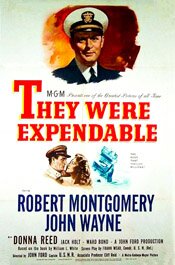 They Were Expendable (1945)
They Were Expendable (1945)
Directed by John Ford
I was very confused when I watched the war movie They Were Expendable because I thought it was from 1941. It turns out that is when the movie is set as it opens. My confusion evaporated, however, when I realized it was from 1945, though it is still an unusual movie that John Ford gives us.
Believe me, with this movie the year really matters – especially if you confuse it with four years earlier.
This movie was released in December of 1945. In World War II, Japan formally surrendered in September of 1945.
The movie is somber recounting of the early days of the war for the U.S., beginning with the attack on Pearl Harbor in December of 1941.
Made with the approval and assistance of the U.S. Navy, Army and Coast Guard, it shows us the U.S. getting its behind kicked by the Japanese – starting in Pearl Harbor and continuing through the Philippines.
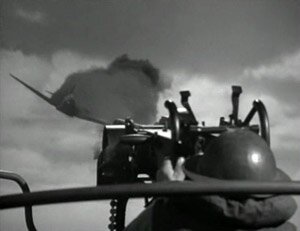
Audiences at the time of the film’s release, however, would be fully and completely aware of the end result of it all – victory in the Pacific; Japan’s surrender.
The reason John Ford shows us all the bad news from the war’s early days is because he’s telling the story of the PT boats – how their role in the war came about (they weren’t highly regarded originally), how they won respect and the sacrifices made by the crews that worked them. (The tagline was, “A tribute to those who did so much… with so little!”) However, the main character is really the boat itself.
The movie is a solemn tribute and sober homage but also full of patriotism which, appropriate to the period of its release, may strike a current day viewer as a bit much.
There are good action scenes in the movie as well as some interesting, almost noir-ish lighting in others. The movie itself appears to be in poor shape, at least on the DVD copy I have. I don’t know if any restorative work went into it but it doesn’t appear so given the scratches in a number of scenes. I’m a bit surprised it comes to use from Warner Brothers. It may have something to do with the lack of good original film materials. I don’t know.
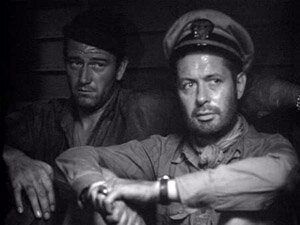
Overall, I can’t say this is a great movie. It’s a curious one, however. It’s worth seeing at least once, especially if you’re a fan of either John Ford or John Wayne. Just keep in mind this movie should probably be viewed as a propaganda work.
And maybe that is what makes it peculiar. It’s quite a bit of “Rah, rah!” about PT boats but seems to also want to be a solid drama and thus it acquires a bipolar quality.
Lucky Jordan a pleasant surprise
Once again, I stumbled on a movie I wasn’t looking for or even aware of. But last night I skipped through channels and came on TCM. The movie they were showing? Lucky Jordan. (Later, they showed The Snows of Kilimanjaro, 1952, a movie I personally find incredibly tedious. But that’s personal taste …)
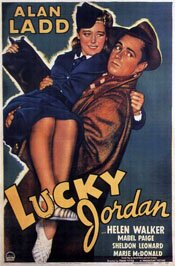 Lucky Jordan (1942)
Lucky Jordan (1942)
Directed by Frank Tuttle
I really wish I had been around in 1942 and been in a theatre at a screening of this movie, Lucky Jordan. I think the response to it would have been fascinating to see.
The U.S. had already endured Pearl Harbour. They had entered World War II. And here was a movie where the lead character wanted nothing to do with the military; he had nothing but disdain for it.
How did they make that fly?
Undoubtedly it helped to have Alan Ladd, who was becoming a name by this time. (He had previously done movies like This Gun For Hire. This movie, Lucky Jordan, was the first one in which he had top billing, I believe.)
Ladd plays Lucky Jordan and through well over the first half of the movie he plays a gangster with no interest or love for anyone but himself and his money. He’s a cynic and believes everything and everyone can be bought, until he comes up against the draft board.
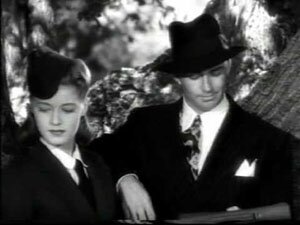 He eventually finds himself in the Army where he is contemptuous of it. He goes AWOL and finally deserts. He comes upon secret military plans which another gangster (Sheldon Leonard as Slip Moran) has plans to sell to the Nazi’s. Slip also has plans to take over from Lucky.
He eventually finds himself in the Army where he is contemptuous of it. He goes AWOL and finally deserts. He comes upon secret military plans which another gangster (Sheldon Leonard as Slip Moran) has plans to sell to the Nazi’s. Slip also has plans to take over from Lucky.
But Lucky has other plans – get rid of Slip and sell the plans himself, but for more money.
In the process he kidnaps Jill Evans (Helen Walker), a woman in the military who pleads love of country to Lucky, but it falls on deaf ears.
The way the movie manages to turn the character of Lucky around, as eventually it must, is through an old woman living in poverty, Annie (aka ‘Ma’), played wonderfully by Mabel Paige. Annie and Lucky adopt one another, so to speak, and develop a kind of mother and son relationship. This is the first time we start to see chinks in Lucky’s cynical armor and the glimmers of a human being.
Alan Ladd plays the part of Lucky nicely. What often comes across is not hard-bitten and cynical but a sense of genuine puzzlement when his motives are questioned. Isn’t everyone out for themselves? Why would he do anything else?
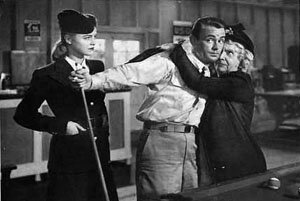 The movie ends with an inevitable patriotic finish, the final scene feeling like an obligatory add-on. But in the process of getting from start to end, it tells a good story about a particular character, Lucky Jordan. In the process, it doesn’t simply use a self-centred individual. The script gives some explanation for why he is as he is by giving some detail on his background.
The movie ends with an inevitable patriotic finish, the final scene feeling like an obligatory add-on. But in the process of getting from start to end, it tells a good story about a particular character, Lucky Jordan. In the process, it doesn’t simply use a self-centred individual. The script gives some explanation for why he is as he is by giving some detail on his background.
On the whole, this movie was a very pleasant surprise. It’s a movie cranked out by the Hollywood factory but it’s also one that manages to work well within its constraints – even push them a little, given how explicitly unpatriotic and unrepentant the character of Lucky is through a large portion of the film.
Guy movie with Gable and gravitas
I’m always astonished when I notice the movies Robert Wise has been involved with, particularly as director. I tend to think of him as a “meat and potatoes” kind of director because I don’t notice him. His movies never draw attention to themselves as movies; they’re simply stories told well.
As an editor, he worked with Orson Welles on Citizen Kane. As director, he’s done movies like The Sound of Music, The Haunting, West Side Story (as co-director) and the movie below, Run Silent, Run Deep.
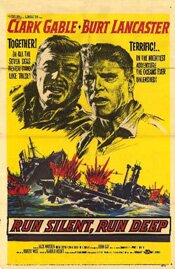 Run Silent, Run Deep (1958)
Run Silent, Run Deep (1958)
Directed by Robert Wise
I saw an interview with the actor Laurence Fishburne the other day in which he was speaking of various influences when he was young. At one point, he brought up the movie Run Silent, Run Deep and Clark Gable. What struck him in the movie was Gable’s gravitas. I immediately thought, “Yes, that is the perfect word for it.”
Fishburne brought this up because Gable would have been in his late 50s when he made the film.
He was not playing the young, dashing, romantic figure of movies like Gone With the Wind. And he wasn’t playing the great white hunter of Mogambo, made only five years earlier.
He does, however, play a “manly man,” which would have had great appeal for him, from the little I know of Gable.
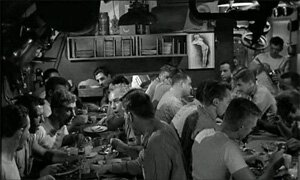 Run Silent, Run Deep is a guy movie. There are really only two female roles in the movie: a very small part as Gable’s wife (Mary LaRoche) and a pin-up poster. It’s all guys and for the most part they are confined in a submarine. Despite that, it’s a good movie. Actually, it is because of that it is a good movie. It knows what it is about and its focus doesn’t waver.
Run Silent, Run Deep is a guy movie. There are really only two female roles in the movie: a very small part as Gable’s wife (Mary LaRoche) and a pin-up poster. It’s all guys and for the most part they are confined in a submarine. Despite that, it’s a good movie. Actually, it is because of that it is a good movie. It knows what it is about and its focus doesn’t waver.
Gable is submarine Commander Richardson, a man who, as we see in the opening scenes, loses the sub he commands when it is sunk by a Japanese destroyer, one that acquires a kind of legendary status because it is so successful in sinking U.S. subs. (The movie is set during World War II.)
After a long wait, Richardson gets another command (one he has specifically gone after). Unfortunately, that sub’s crew thinks their first officer, Lieutenant Jim Bledsoe (Burt Lancaster) is getting the command, as does Bledsoe. When Richardson comes aboard to take over, it is to a resentful crew and first officer.
Things don’t improve when he makes the crew go through the same drill repeatedly, obsessed with shaving seconds off the time it takes to dive and launch torpedoes. It further degrades when this new commander appears to avoid going after Japanese ships. It strikes the crew as cowardly.
It turns out the commander has plans: against orders, he intends to take the sub into dangerous waters and sink the unsinkable ship that is taking out all the U.S. subs, including Commander Richardson’s previous submarine.
It’s a simple, direct story and won’t ever be accused of being overly sophisticated. But it’s virtue is its simplicity and directness. Director Robert Wise has left nothing necessary out and has put nothing unnecessary in.
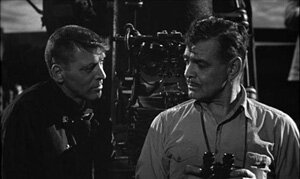 Gravitas, like the word gravity, comes from the Latin word “gravis” which means seriousness or weightiness. Gable communicates it wonderfully. Lancaster does to a degree too, though in a different way. Between the two actors, you get a nicely dramatic contrast.
Gravitas, like the word gravity, comes from the Latin word “gravis” which means seriousness or weightiness. Gable communicates it wonderfully. Lancaster does to a degree too, though in a different way. Between the two actors, you get a nicely dramatic contrast.
Gable, outside moments of command, speaks in a drawling, friendly manner. In moments of command, he’s brusque and direct. Lancaster, on the other hand, with his character’s resentment, speaks in a clipped fashion. He also communicates a sense of simmering anger that only his naval discipline keeps in control.
It’s the dynamic between the two characters that really propels this movie, though a straightforward, determined plot nicely aids it.
I’ve seen this movie several times over the years and have liked it every time. Initially, I was a young boy and thought it was cool because it had submarines and torpedoes. Grown up, I like it because it is just a good, well told story.


